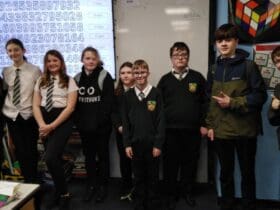Students and researchers came together to discuss AI and its wide variety of applications at a special event hosted by Swansea University.
The annual conference of UKRI Centre for Doctoral Training in Artificial Intelligence, Machine Learning and Advanced Computing (AIMLAC) was held in collaboration with the Zienkiewicz Institute for Modelling, Data and AI, at the University’s Bay Campus.
It saw more than 50 participants taking part in a varied programme of presentations on applications of AI and machine learning in particle physics and astronomy, health, and engineering, while also highlighting developments in computer science.
Many of the speakers were doctoral researchers associated with AIMLAC who enjoyed special sessions devoted to issues including AI governance.
A panel consisting of Adrian Tate (NAG), Kelly Knock (JD Power), Chris Cormack (Quant Foundry), Paul Coppin (Technology Boutique) and Paige Windiate (Enterprise Marketing Support Officer at Swansea)discussed employability with CDT students. There were additional talks exploring opportunities working at the Office for National Statistics with Debbie Cooper and at DiRAC with Professor Simon Hands.
The highly topical subject of AI governance and policy was discussed by a panel consisting of Welsh Government’s Head of AI Strategy and Coordination Mike Thomas, Arron Lacey (Alan Turing Institute, working in health) and Kris Stoddart, Associate Professor for Cyber Threats at Swansea University.
An additional presentation by Professor Yvonne McDermott Rees and Dr Alice Liefgreen, from Swansea’s Hillary Rodham Clinton School of Law, highlighted the legal implications of deep fakes.
The conference was brought to a close with a session led by the University’s Senior Entrepreneurship Officer Kelly Jordan about entrepreneurship, a subject particularly relevant for the students close to graduation.
Professor Gert Aarts, Director of AIMLAC said: “Our annual meeting is a great opportunity to intersperse research talks with special sessions dedicated to current issues relevant to graduating students and the wider community. I am particularly grateful to the external guests whose contribution is invaluable, especially with developments in AI happening at speed.”








Leave a Reply
View Comments